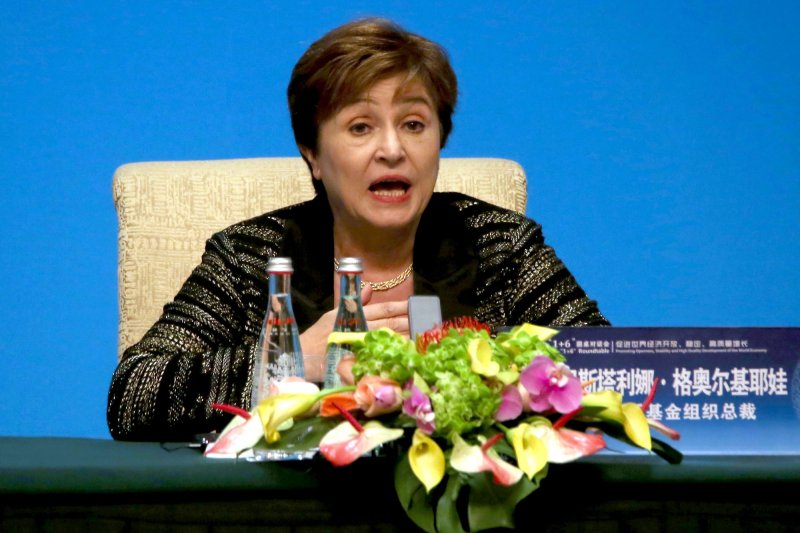The International Monetary Fund Managing Director Kristalina Georgieva said there has been a fundamental shift in the global economy from a world of relative predictability to a world with more fragility and greater uncertainty. File Photo by Stephen Shaver/UPI |
License Photo
Oct. 6 (UPI) -- International Monetary Fund Director Kristalina Georgieva said Thursday the world economy faces a darkening outlook brought about by shock after shock causing a global output loss of $4 trillion by 2026.
The IMF has downgraded economic growth projections to 3.2% for 2022 and 2.9% for 2023. The IMF also lowered growth projections back in April.
In a Georgetown University speech, Georgieva said there has been a fundamental shift in the global economy from a world of relative predictability to a world with more fragility and greater uncertainty.
"In less than three years, we lived through shock, after shock, after shock," she said, citing global events such as the COVID-19 pandemic, Russia's war on Ukraine and climate disasters on all continents.
"These shocks have inflicted immeasurable harm on people's lives," she continued. "Their combined impact is driving a global surge in prices, especially on food and energy, causing a cost-of-living crisis."
During this period of heightened economic fragility, Georgieva said, it's vital that immediate challenges be addressed to stabilize the world economy.
The IMF believes the risks of recession are rising and urges the first priority to be staying the course on fighting worldwide inflation.
Failure to do that now, she said, would likely lead to inflation becoming "de-anchored and entrenched". She said that would cause massive harm to growth and massive harm to people.
Georgieva said the second global economic priority ought to be creating responsible fiscal policies to protect the vulnerable in lower-income households without fueling higher inflation. She warned against indiscriminate financial support across the board because she said that would make it harder to fight inflation.
Longer term, Georgieva said the IMF believes that transformational reforms are needed to stabilize the global economy. They include stepping up action on food insecurity, which affects 345 million people worldwide, and developing much stronger cooperation in addressing the existential threat of climate change.
On climate change, the IMF has created its first long-term lending tool called the Resilience and Sustainability Trust with funding pledges of $40 billion.
Since the COVID-19 pandemic started, the IMF has provided $258 billion in financial assistance to 93 countries, Georgieva said. And since Russia's invasion of Ukraine, the IMF has supported 16 nations with nearly $90 billion, according to Georgieva.















